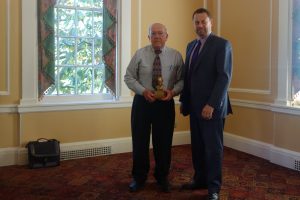
David Schmalzer, BS ’64, MS ‘65, and acting chair of the Department of Chemical and Biomolecular Engineering’s External Advisory Board, was awarded the Johns Hopkins Alumni Association Heritage Award in May 2018 by T.E. “Ed” Schlesinger, the Whiting School of Engineering’s Benjamin T. Rome Dean. The award was presented in recognition of Schmalzer’s long service to the department and the university.
“It has been kind of the Alumni Association to award me the Heritage Award,” says Schmalzer, who lives in Fairfax County, VA. “I have focused on helping undergraduates through scholarship programs and the ChemBE Department where, arguably, I have some level of technical competence, as well as an active interest in how the department operates and how it educates and nurtures its students. I am gratified that the School of Engineering returned as the Whiting School of Engineering and hope it will continue permanently as a major and featured part of the university.”
Schmalzer, a native of Freeland, MD, attended Johns Hopkins through Maryland’s state engineering scholarship program. After completing his bachelor’s degree in what was then the Department of Chemical Engineering, he stayed to work for then-chair Harold “Hal” Hoelscher, completing his master’s degree under Hoelscher’s direction. Schmalzer’s research focused on fast interfacial reactions and also veered into modeling. He then followed Hoelscher to the University of Pittsburgh, earning a PhD while continuing his computational modeling studies into mixing and mass transfer.
Schmalzer spent the next 20 years at Gulf Oil. He started off in R&D, looking at process development in the refinery and petrochemical areas. Next came process economics, focusing on preliminary design and cost estimation. Then, in the early 1970s when concerns were growing about oil and gas reserves, he transferred to Gulf Mineral Resources Co. to work on process evaluation and process economics related to the Mt. Taylor, NM uranium mine, the Colorado CA Tract Prototype Shale Lease, coal liquefaction, and coal gasification.
In 1975, he moved to the Ft. Lewis military reservation near Tacoma, WA for the startup of the Solvent Refined coal pilot plant. From there, he went Merriam, KS to manage a coal research lab, then transferred to Gulf Mineral Resource’s new headquarters in Denver, serving as R&D manager for a joint venture among Gulf, Mitsui, and Ruhrkole. In 1981, he became the joint venture’s managing director, and in 1985, Gulf was acquired by Chevron and Schmalzer moved to Argonne National Laboratory, where he managed the fossil energy research program.
The program at Argonne focused on environmental and efficiency issues in coal-based electrical generation, but he also served as chair of an inter-laboratory working group on upstream environmental issues in oil and gas exploration and production. He remained there until 2008, when he shifted into a consulting role for Argonne and other companies, including National Renewable Energy Laboratory, Oak Ridge National Lab, and Northeast States for Coordinated Air Use Management. He continues his advisory role with Argonne today, focusing on solutions for coal-fired power plants operated away from their base load design and carbon dioxide emissions.
Schmalzer began supporting the Johns Hopkins Alumni Association around 1970, soliciting fellow alums who were Gulf co-workers to take advantage of the company’s matching contributions program. “I was interested in helping the university,” Schmalzer says of his years of service. “I had come to Johns Hopkins under the scholarship program, so to some extent it was returning a favor, doing a little bit to help where I had been helped.”
Around 2010, Richard “Dick” Nozemack ’67, who had been Schmalzer’s Kappa Alpha Order pledge son back in their undergrad days, got in touch to ask him to join ChemBE’s advisory board, and he agreed, joining a committed group of ChemBE supporters who meet twice a year to help guide the department and set long-term goals. Along with the rest of the board, Schmalzer saw the department through a transition between Whiting School deans, and spent years helping to facilitate a reduction in the higher than average student-faculty ratio.
“Between the new leadership and the addition of the Bloomberg Distinguished Professors, the board’s sense is that the ratio is much improved,” Schmalzer says.
Schmalzer and the board also worked with department leadership on some curriculum adjustments in recent years. Most notably, training in the process simulation program Aspen was strengthened, and a required course in cell biology is now offered within ChemBE and geared toward engineers. Looking ahead, Schmalzer sees ChemBe’s tight quarters in an older building as the department’s greatest ongoing challenge and looks forward to continuing to seek solutions.
Schmalzer is a member of AIChE and ACS and is a registered professional engineer in Pennsylvania. He has served as an author and the editor of the coal and energy conversion sections of Perry’s Chemical Engineers’ Handbook.
The Heritage Award was established in 1973 to honor alumni and friends of Johns Hopkins who have contributed outstanding service over an extended period to the progress of the university or the activities of the Alumni Association.